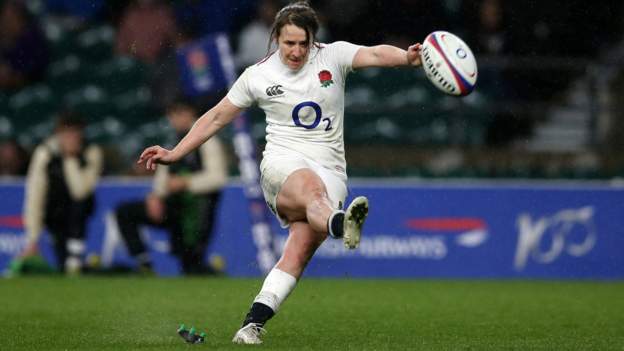
Former England captain Katy Daley-Mclean disagrees with current head coach Simon Middleton's suggestion that goal-kicking rules should change in women's rugby.
On Wednesday, Middleton said the distance of women's kicks should be limited because of physical differences with men's players.
But Daley-Mclean says such a change could stifle the game's development.
"I don't agree with Simon," the World Cup-winner told Rugby Union Weekly.
England converted eight of the 22 tries they scored in the first two rounds of the Women's Six Nations.
Across those two rounds, 46% of tries were converted, compared with 68% after two rounds of the men's event.
In rugby union, a conversion kick must be taken in line with where the try-scorer grounded the ball behind the tryline.
Middleton has suggested if a try is scored within five metres of the touchline in women's rugby, the kicker should have the option to take the kick from 10 metres inside the touchline to reduce the distance to the posts.
Daley-Mclean says this will "look a bit naff", adding: "Having played the game, if we start changing things like kicking, then we might as well shorten the pitch and change the ball size."
Middleton denies being 'patronising'
Middleton's comments prompted debate on social media, with the official Rugby World Cup account tweeting a video of women's players kicking successful conversions from the sideline.
Asked on 5 Live Breakfast to respond to those who say his idea is patronising, Middleton said: "I don't think so.
"I've been in the game 10 years with the Red Roses. We're talking about something that makes the game a bit more rewarding for players who practise skills.
"It's no different to the ladies' tee in golf. It's simply looking at the physiology of the players and trying to equate it to what we're asking them to do."
'Does it stop development?'
Daley-Mclean understands why Middleton has "gone to bat for his players", with the Red Roses goal-kickers under scrutiny for a lack of accuracy.
She added: "What Simon Middleton is right about is as this game gets more competitive, the goal-kicking game will be huge because the margin between teams will be much smaller.
"Missing three or four penalties, four or five conversions, could cost you a game. For me, bringing something like this in - does it stop the development?
"If we put parameters like that on other things in the women's game, would the game be where it is now? Would we have stifled it by trying to create this identity, rather than finding out how good the athletes can be?
"You think about the growth in individuals in the last four or five years, the game is unrecognisable. I wonder whether when we sit down again in five years' time we'll say the same about goal-kicking."
Daley-Mclean says "context is everything" given many current women's players picked up rugby later in life compared with those in the men's game.
England have only recently brought in kicking coach Alex Davies to work with players; Daley-Mclean said she was 24 when she first received kicking coaching.
"If you compare that across to the boys, a lot of young lads are in academies where they're probably having regular kicking lessons from 16 or 17," she explained.
"We've got to take into account when these women started goal-kicking and what the level of coaching they've had for their technique is. I think some of them will be self-taught."















 Phone: (800) 737. 6040
Phone: (800) 737. 6040 Fax: (800) 825 5558
Fax: (800) 825 5558 Website:
Website:  Email:
Email: 






